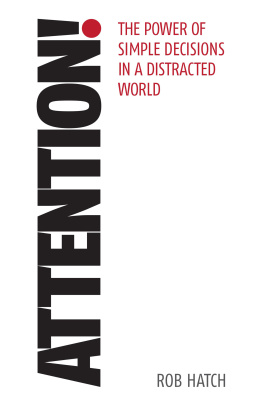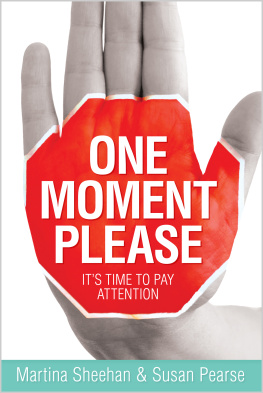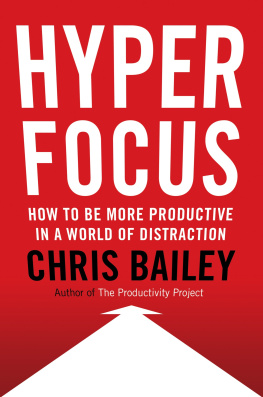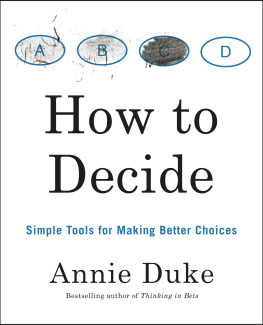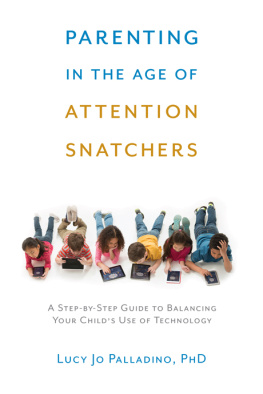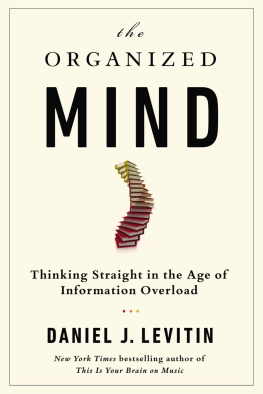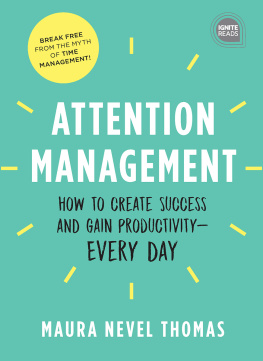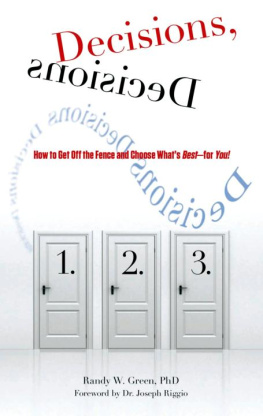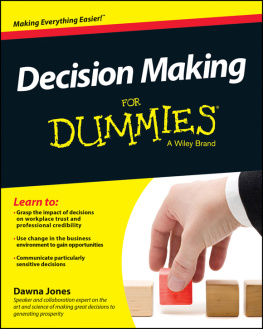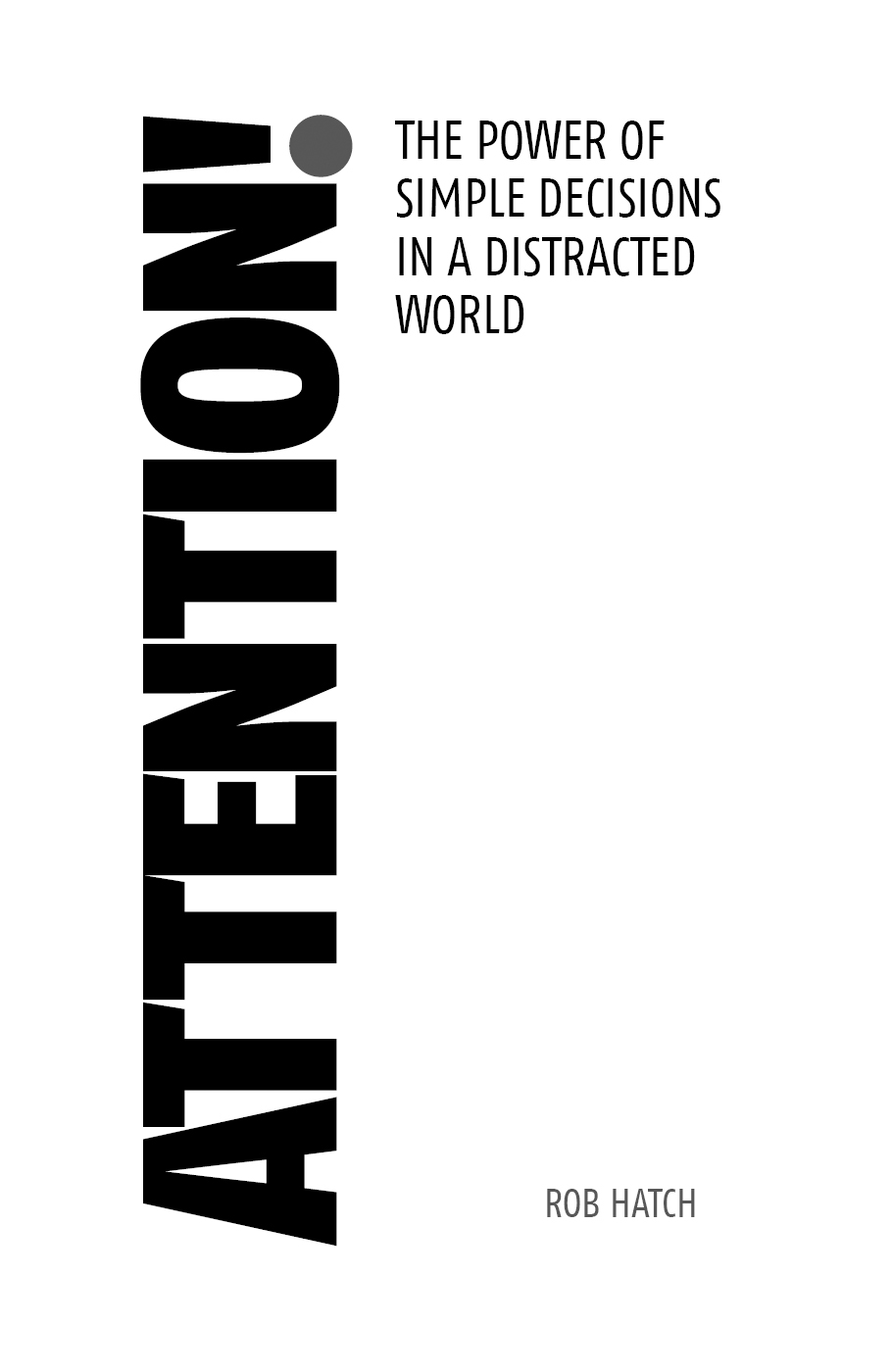Endorsements
Rob Hatch has created something new in a crowded field: a flexible method that reframes how we can do our best work better. Because he built these frameworks for himself and his own struggles, theyre simple and practical. Because hes been teaching them to hundreds of people, you know they work. I use these methods myself and with my team. It gives us the flexibility to be freely creative in our creative work and solidly productive in our structured work.
Becky McCray, beckymccray.com
With Attention!, Rob Hatch offers an inspiring and practical guide that can support us all with putting greater success in our way. So many of us currently find ourselves living in a constant state of information overload and distraction that hinders our ability to focus on the things that matter most. The cutting-edge tools and frameworks included in this book help transform anxiety, overwhelm, and decision fatigue into new empowered habits that can lead to confident intentional action towards more meaningful success. This book should be considered essential reading if you are seeking to more effectively leverage your time, energy, and effort for the most impactful outcomes in these rapidly changing times.
Aime Miyamoto, Business Alignment Consultant
Rob has been telling me these ideas for more than a decade. As hes learned the concepts and tested them, hes taught them. More significantly, hes lived them. Ive eaten his breakfast sandwiches when visiting his family. Ive listened to the conversations with his family and seen the growth across time. Ive watched his example and been shaped. Im grateful that this approach to attentiveness is now available to people beyond Robs friends and clients. I can testify that its grounded in a deep caring for the people around him.
Jon Swanson PhD, Hospital chaplain and writer
Attention! is a spiritual call to intentionality and a neurological commitment to a practical minimalism. From opening premise to page layout, Rob Hatchs examples of personal pain points stoke the embers of curiosity and self-examination while each page turned promises to bring the reader to the Zen-like conclusion that less is more.
Robbie Grayson, Traitmarker
First published in Great Britain by Practical Inspiration Publishing, 2020
Rob Hatch, 2020
The moral rights of the author have been asserted
ISBN 978-1-78860-145-0 (print)
978-1-78860-144-3 (epub)
978-1-78860-143-6 (mobi)
All rights reserved. This book, or any portion thereof, may not be reproduced without the express written permission of the author.
Every effort has been made to trace copyright holders and to obtain their permission for the use of copyright material. The publisher apologizes for any errors or omissions and would be grateful if notified of any corrections that should be incorporated in future reprints or editions of this book.

For Megin. You are the driving force for everything I do. Thank you for the time and space to make Attention! a reality.
For my Mom. You are a gift of kindness and strength. Thank you for providing a platform from which I could step out into the world.
Contents
About the author
R ob Hatch is the co-founder and president of Owner Media Group, providing strategies and skills for the modern business.
He is also a highly sought-after business coach and advisor serving executives and owners of organizations large and small.
As a speaker, trainer, and coach, Rob works primarily with business leaders and teams, guiding them through transitional moments in their organization.
Most importantly, Rob is dedicated to helping you do your work, better. This is accomplished through a private group coaching experience, through courses, and through business advisory and coaching offerings.
Rob lives in Maine with his award-winning photographer wife, Megin. They have four children and spend most of their time encouraging and supporting them as they pursue their passions.
Foreword
by Robert Brooks, PhD
I was trained as a clinical psychologist more than 40 years ago and during my career I have witnessed several major changes of focus in my profession. One of the most dramatic has been a shift from a so-called medical model with its emphasis on fixing deficits in people to a strength-based perspective that places the spotlight on identifying and utilizing each persons strengths or what I have referred to as their islands of competence.
This shift is associated with the emergence of the field of positive psychology and an increased interest in a concept that has been a major focus of my work, namely, resilience. Studies of resilience in both children and adults have attempted to identify individual factors as well as environmental forces that contribute to our ability to deal more effectively with stress and to thrive in the face of adversity.
In my roles as a clinician, consultant, and parent, I have often considered the question, How do resilient children or adults see the world and themselves differently from those who are not resilient? This represented more than an academic question for me. I assumed that the more precisely we could identify those characteristics that defined the mindset and behaviors of resilient individuals, the more we could develop strategies to nurture resilience in both our children and ourselves.
I discovered that one key attribute of resilient individuals was their adherence to a lifestyle rooted in what I have labeled personal control. Resilient people demonstrated an impressive capacity to focus their time and energy on situations over which they had some control or influence rather than on situations in which they had little, if any, impact.
Personal control represents a very significant quality in determining our emotional and physical well-being. While conducting therapy I constantly witnessed the negative outcomes associated with the absence of a sense of personal control. I heard accounts of people who based their happiness on others changing first (e.g., I would be happy if only my wife treated me better), or who continued to cast blame on a particular situation for the misery they experienced in their lives (e.g., Why did I have to be born with a learning disability? Its not fair!), or who felt so pessimistic that they could not even consider steps they might initiate to improve their lives. Often a victim mentality dominated their existence.
In contrast, through interviews and correspondence, I heard from individuals who when unhappy would examine what they could do differently to improve the situation, of children or adults with learning problems who moved away from a position of asking why me? to adopting the attitude, I had no control over having learning problems; what I do have control over is finding the best ways to learn, and the best people who can help me.
Given these first-hand accounts I gathered from resilient people, I voiced the opinion that we are the authors of our own lives, that while events occur beyond our control, what we have more control over than we may realize is our attitude and response to these events.
Next page
